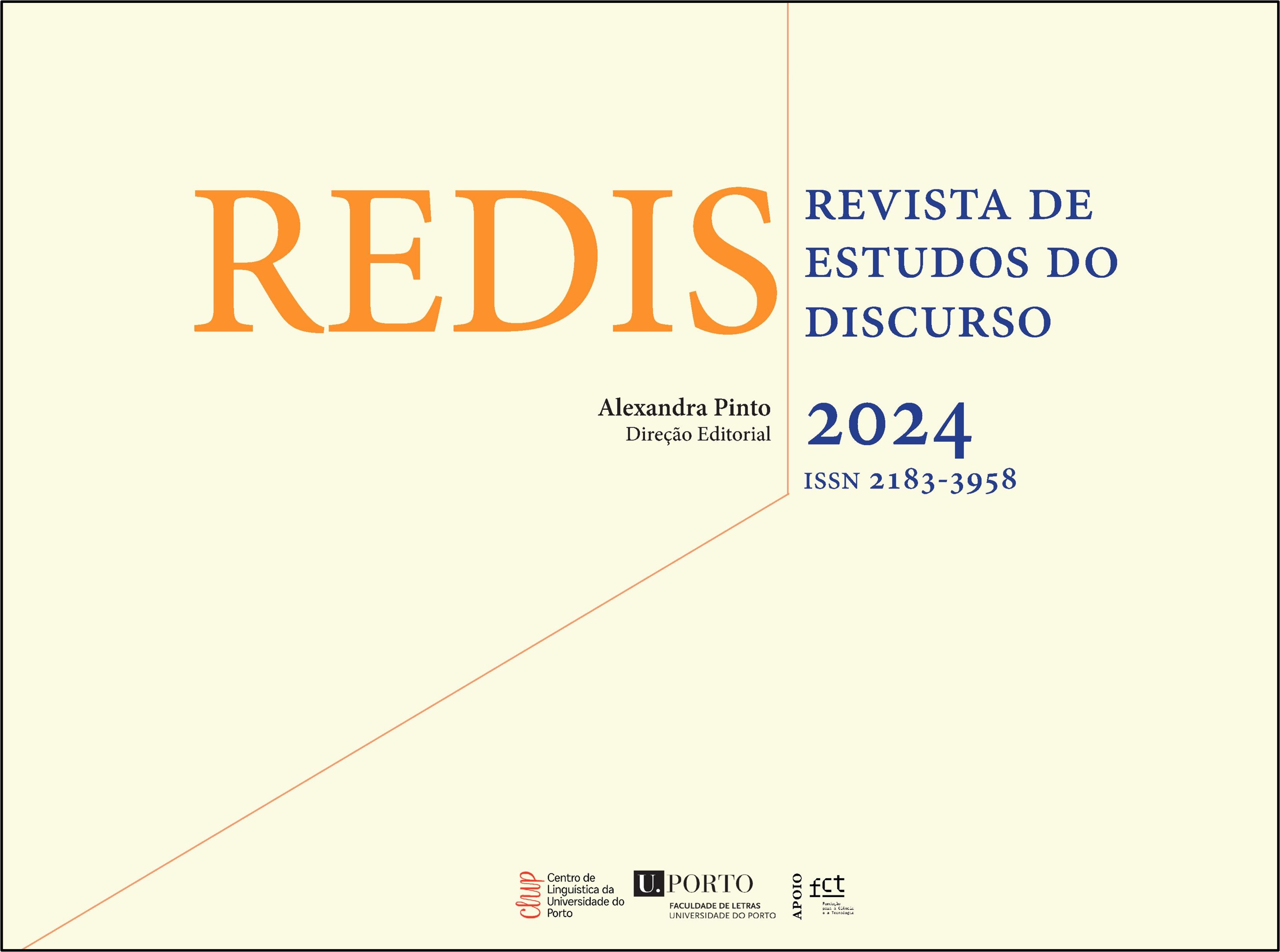O tempo e a memória n’A Ignorância, de Milan Kundera
DOI:
https://doi.org/10.21747/21833958/red14a8Palavras-chave:
Deixis, Tempo, Memória, Tempos verbaisResumo
Este estudo tem como objetivo principal contribuir para uma análise do tempo na obra A Ignorância de Milan Kundera, tendo como base a conceção de romance como configurador do tempo, de acordo com as perspetivas teóricas de Benveniste (1978), Oliveira e Lopes (1995) e Fonseca (1992; 1996). Assim, foram analisados os elementos deíticos a fim de se evidenciar a sua contribuição para a criação de um mundo alternativo, cuja raiz se encontra na ficcionalidade do próprio ato de referência, através da transposição das coordenadas enunciativas de um “aqui/ agora” para um “lá/ então”. Com efeito, surge-nos narrada a forma como as personagens principais experienciam os acontecimentos com base num repositório de saberes e experiências – a memória. As personagens vão presentificando os momentos passados, tornando-os presentes. Contudo, como cada uma recorda apenas parcelas do vivido, a “memória comum” que levam para um ato de interação apresenta diferenças, provocando relevantes desencontros comunicativos.
Referências
Adam, J.-M. (2011). A Linguística textual. Introdução à análise textual dos discursos. São Paulo: Cortez.
Bühler, K. (1982) [1934].The deictic field of language and deictic words. In: Jarvella, Robert; Klein, Wolfgang (eds.). Speech, Place, and Action: Studies in Deixis and Related Topics. Chichester: John Wiley & Sons, Ltd, 9–30.
Bach, E. (1989). Informal Lectures on Formal Semantics. Albany: Suny Press.
Benveniste, E. (1978). O homem na Linguagem: ensaios sobre a instituição do sujeito através da fala e da escrita. Lisboa: Vega Universidade.
Cunha, C.; Cintra, L. (1996). Nova Gramática do Português Contemporâneo. Lisboa: Edições João Sá da Costa.
Fleischman, S. (1982). The future in thought and language. Cambridge: Cambridge University Press.
Fonseca, F. I. (1992). Deixis, Tempo e Narração. Porto: Fundação Engenheiro António de Almeida.
Fonseca, F. I. (1993). Quand dire c’est feindre: théorie linguistique et fiction littéraire. Revista da Faculdade de Letras - Línguas e Literaturas, II série, vol. X, Porto, 55-62.
Fonseca, F. I. (1994a). O perfeito e o pretérito e a teoria dos níveis de enunciação. In: Fonseca, F.; Fonseca, J. Gramática e Pragmática. Estudos de Linguística Geral e de Linguística Aplicada ao Ensino de Português. Porto: Porto Editora.
Fonseca, F. I. (1994b). Deixis, dependência contextual e transposição fictiva. In: Fonseca, F.; Fonseca, J. Gramática e Pragmática. Estudos de Linguística Geral e de Linguística Aplicada ao Ensino de Português. Porto: Porto Editora.
Fonseca, F. I. (1996). Deixis e Pragmática linguística. In: Faria, I.; Pedro. E.; Duarte, I.; Gouveia, C. (org.). Introdução à Linguística Geral e Portuguesa. Lisboa: Caminho.
Fonseca, J. (1992). Linguística e Texto/Discurso: teoria, descrição, aplicação. Lisboa: ICALP.
Kundera, M. (2002). A arte do romance. Lisboa: Dom Quixote.
Mateus, M. H.; Brito, A. M.; Duarte, I.; Faria, I. H. (2003). Gramática da Língua Portuguesa. Lisboa: Caminho.
Oliveira, F. (1991). Funções discursivas de alguns tempos do passado. Encontro de Homenagem a Óscar Lopes. Lisboa, APL, 165-186.
Oliveira, F.; Lopes, A. M. (1995). Tense and Aspect in Portuguese. In: Thieroff (org.). Tense systems in European language, vol. II, Tübingen, Max Niemeyer Verlag, 95-115.
Pinto, A. G. (2002). Contexto e significação – uma reflexão em torno de A Insustentável Leveza do Ser de Milan Kundera. Revista da Faculdade de Letras - Línguas e Literaturas, II série, vol. XVIII, Porto, 379-373.
Searle, J. (1979). Expression and Meaning. Studies in the theory of Speech Acts. Cambridge: Cambridge University Press.
Silva, F. (2003). A temporalidade em O Homem de Sophia de Mello Breyner Andresen. Língua Portuguesa: Estruturas, Usos e Contrastes. Porto, CLUP, pp. 79-95.
Weinrich, H. (1984). No princípio era a narração. RUNA – Revista Portuguesa de estudos Germanísticos, 2, Coimbra, 127-141.
Downloads
Publicado
Como Citar
Edição
Secção
Licença
Direitos de Autor (c) 2024 Cláudia Alexandra Moreira da Silva

Este trabalho encontra-se publicado com a Licença Internacional Creative Commons Atribuição 4.0.
Os autores cedem à REDIS: Revista de Estudos do Discurso, o direito exclusivo de publicação dos seus textos, sob qualquer meio, incluindo a sua reprodução e venda em suporte papel ou digital, bem como a sua disponibilização em regime de livre acesso em bases de dados.




